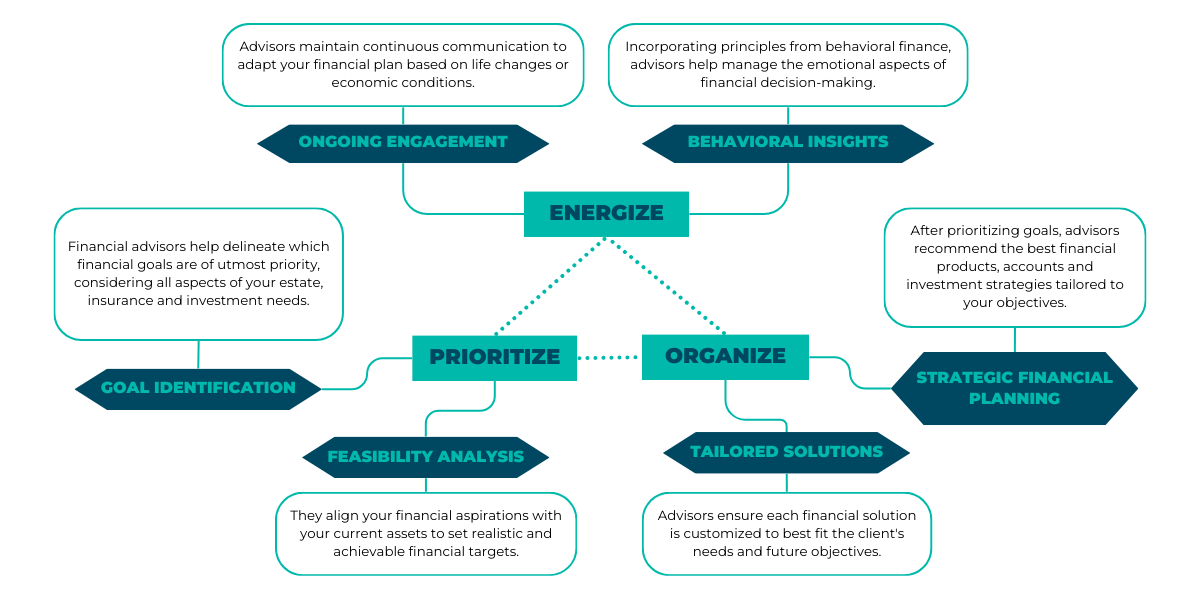How Financial Advisors Work
Financial advisors offer more than investment advice
Key Takeaways:
- Financial advisors provide strategic guidance tailored to complex financial situations, often characterized by diverse asset portfolios and multifaceted estate plans.
- Selecting a financial advisor involves assessing both tangible qualifications and intangible qualities.
- A competent financial advisor plays an important role in this journey, ensuring your wealth is not only preserved but also enhanced.
When navigating the complexities of wealth management and investment strategies, high-net-worth individuals face unique challenges and opportunities. Are you leveraging the right financial tools to preserve and grow your wealth? How can you ensure your financial legacy is secured and efficiently transferred to the next generation? Choosing a skilled financial advisor is pivotal in answering these questions and guiding your financial journey.
A Brief History of Financial Advisors
The role of financial advisors has evolved significantly since the inception of the financial services industry. Here’s a quick overview:
- 1792: The birth of the U.S. Stock Exchange marks the beginning of formal financial markets in the United States.
- 1929: The Great Depression exposes the need for regulatory frameworks in financial markets.
- 1933 and 1934: The Securities Acts of 1933 and 1934 establish regulations for primary and secondary markets.
- 1940: The Investment Advisors Act sets the stage for regulatory standards governing investment advice, differentiating commissioned brokers from independent advisors.
These legislative actions laid the groundwork for the financial advisory profession as we know it today, emphasizing the importance of providing personalized, client-centered advice over merely executing trades.
What Do Financial Advisors Do?
Financial advisors offer more than investment advice. They provide strategic guidance tailored to complex financial situations, often characterized by diverse asset portfolios and multifaceted estate plans. The primary function of an advisor can be summarized in three words:
- Prioritize
- Organize
- Energize

How to Choose a Financial Advisor
Selecting a financial advisor involves assessing both tangible qualifications and intangible qualities:
Quantifiable Factors
- Expertise: Ensure the advisor has experience managing similar asset sizes and complexities.
- Compensation: Understand their fee structures (fee-only, commission-based, etc.) to ensure alignment with your financial interests.
- Certifications: Prioritize advisors with reputable credentials like CFP© or CHFC©, which reflect advanced knowledge and ethical practice.
Qualifiable Factors
- Personal Compatibility: Evaluate whether the advisor’s communication style and investment philosophy align with your personal preferences and values.
- Trustworthiness: The relationship should be built on transparency, honesty, and mutual respect.
Can Financial Advisors Give Tax Advice?
Financial advisors are equipped to consider your tax situation as it relates to your overall financial picture, but they typically defer specific tax-related questions to Certified Public Accountants (CPAs).
At Adams Brown Wealth Consultants, our advisors understand the tax implications of investment decisions. Our team includes financial advisors who are also certified public accountants. This dual expertise enables them to handle complex issues like income, estate and gift tax planning effectively, ensuring your financial strategies are both growth-oriented and tax-efficient. This comprehensive approach allows Adams Brown to offer tailored advice that aligns with both your financial and tax planning needs.
Will Financial Advisors be Replaced by AI?
The integration of AI into financial advising is growing, as AI technologies like ChatGPT offer assistance in areas such as budgeting and debt management. However, while AI can handle quantitative and routine tasks efficiently, it lacks the capability to fully understand complex human emotions or the nuanced requirements of high-stakes financial decision-making.
Although AI will become a more significant tool in the financial services industry, it will complement rather than replace the critical functions performed by human financial advisors.
Questions?
Navigating your financial future demands a trusted partnership. A competent financial advisor plays an important role in this journey, ensuring your wealth is not only preserved but also enhanced. Contact an Adams Brown Wealth Advisor to discuss your financial goals.
